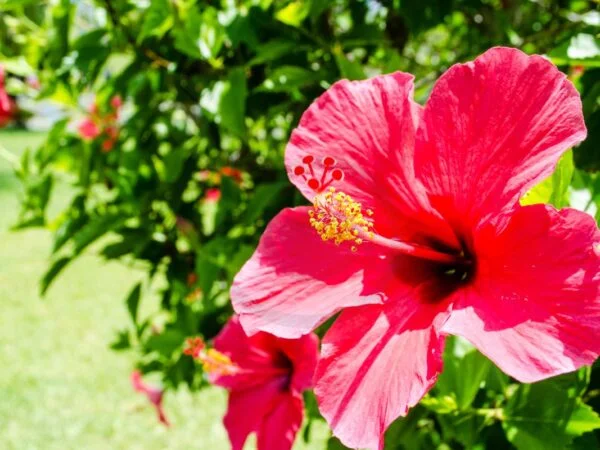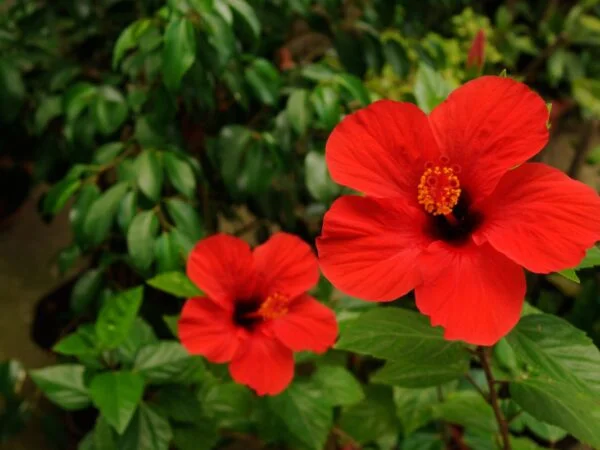If you're wondering how to keep ants off hibiscus plants, you've come to the right place. With our expert tips and simple solutions, you can protect your beautiful hibiscus flowers from pesky ant invasions.
Ants can disrupt the growth and health of your hibiscus, but fret not - we have effective methods and natural remedies to keep them at bay. Stay tuned for practical advice on creating a barrier to pests, using safe repellents, and maintaining a pest-free environment around your cherished hibiscus plants. Let's ensure your hibiscus blooms thrive without any unwanted ant, aphid, or pests interference.
Key Takeaways
-
Understand Ants: Recognize the behavior of ants, pests, around hibiscus plants to effectively address infestations.
-
Implement Preventive Measures: Regularly inspect and clean the garden to deter ants from invading hibiscus plants.
-
Choose Organic Solutions: Opt for natural remedies like diatomaceous earth or vinegar to keep ants away without harming the environment.
-
Practice Long-term Management: Combine chemical controls with physical removal techniques for a comprehensive approach to ant infestations.
-
Monitor and Adjust: Continuously assess the effectiveness of ant control methods on hibiscus plants and adapt strategies as needed.
-
Maintain Hibiscus Care: Ensure proper watering, sunlight, and soil conditions to keep hibiscus healthy and less attractive to ants.
Understanding Ants
Behavior
Ants display specific behavior patterns near hibiscus plants, often forming trails and clusters around the stems. They interact with aphids on hibiscus leaves by protecting them from predators like ladybugs. Observing ant movement helps in understanding their attraction to hibiscus.
Attraction Factors
Ants are drawn to hibiscus due to nectar, a sweet substance produced by its flowers. The specific elements of hibiscus that attract ants include the sweetness of the nectar and the presence of aphids. Ants perceive hibiscus as a food source, which further enhances their attraction.
Impact on Hibiscus
Ants carrying aphid eggs onto hibiscus can have detrimental effects on the plant's health. This action leads to the formation of black sooty mold on hibiscus leaves, affecting their photosynthesis process. Ants also protect aphids from predators, creating an imbalance that impacts overall hibiscus health.
Hibiscus Care Basics
Watering Techniques
Proper watering practices prevent ants from hibiscus by adjusting frequency and soil moisture levels. Implement these strategies.
l Requirements play a crucial role in deterring ant infestations on hibiscus. Soil quality impacts ant behavior significantly.
Sunlight Exposure
Sunlight exposure serves as a natural deterrent for ants on hibiscus. Position plants strategically to minimize ant attraction.
Identifying Ant Infestations
Signs and Symptoms
Ant infestations on hibiscus can be recognized through visible ant trails on the plant stems. Symptoms of aphids due to ants include sticky honeydew residue on hibiscus leaves. Monitor plant health for wilting leaves or stunted growth caused by ant activities.
Ant Varieties
Differentiate ant species like Argentine ants, fire ants, or carpenter ants that commonly infest hibiscus plants. Understand behavior patterns of specific ant varieties such as nesting near hibiscus roots or feeding on plant sap. Identify key characteristics of threatening ants like aggressive behavior towards pollinators.
Organic Solutions
Natural Repellents
To keep ants off hibiscus, explore natural repellents that effectively deter these pests. Implement non-toxic solutions like essential oils such as peppermint, cinnamon, or citrus to naturally repel ants from hibiscus plants. These oils disrupt the ants' pheromone trails, deterring them effectively. Consider planting herbs like mint, basil, or lavender around your hibiscus as they possess ant-repelling properties.
-
Essential oils like peppermint and citrus
-
Herbs like mint and basil
-
Disrupting ants' pheromone trails
Barrier Methods
Establishing physical barriers is an effective way to prevent ants from reaching your hibiscus. Spread a layer of diatomaceous earth around the base of the plant to create a barrier that ants avoid crossing. This natural substance is harmless to plants but acts as a deterrent for insects. By implementing barrier methods, you can disrupt ant trails leading to your precious hibiscus blooms.
-
Diatomaceous earth as a natural barrier
-
Preventing ants from reaching hibiscus
-
Disrupting ant trails effectively
Beneficial Insects
Introducing beneficial insects into your garden can help control ant populations near hibiscus plants. Ladybugs are natural predators of aphids, which are often tended by ants for their honeydew secretions. By encouraging ladybugs in your garden, you create a natural balance that reduces both aphids and the ants attracted to them. Beneficial insects play a crucial role in maintaining the overall health of your hibiscus plants.
-
Ladybugs as aphid predators
-
Encouraging beneficial insects in the garden
-
Maintaining hibiscus health naturally
Chemical Controls
Safe Use Guidelines
Implement safe practices to minimize risks to hibiscus and the environment when using pesticides. Follow safety guidelines for proper pesticide application to protect your hibiscus plants effectively. Understanding the importance of correct pesticide usage is crucial in keeping ants at bay.
Effective Products
When dealing with ant infestations on hibiscus, explore effective ant control products that are safe for your plants. Consider using ant baits containing boric acid for targeted elimination of ants without harming the hibiscus. Opt for systemic imidacloprid products to prevent aphids brought by ants from damaging your hibiscus.
Physical Removal Techniques
Manual Methods
Employ manual methods such as hand-picking ants off hibiscus plants to directly address the ant presence. This hands-on approach allows for immediate action against ant infestations on hibiscus. By physically removing the ants, you can significantly reduce their numbers and prevent further damage to the plant.
Use physical removal techniques to manage ant populations on hibiscus effectively. This method is environmentally friendly and does not involve the use of any chemicals that may harm the plant or surrounding ecosystem. By regularly inspecting your hibiscus and manually removing ants, you can maintain a healthy environment for your plant to thrive.
Implement manual control measures to address immediate ant infestations on hibiscus plants. Regularly check the leaves, stems, and flowers for any signs of ants and promptly remove them by hand. This proactive approach helps prevent ant colonies from establishing themselves on your hibiscus and causing potential harm.
Water Jetting
Utilize water jetting as a non-invasive technique to dislodge ants from hibiscus leaves without causing damage. By using controlled water pressure, you can effectively remove ants while ensuring the safety of your plant. Water jetting is an eco-friendly method that can be used regularly to keep ants at bay.
Apply controlled water pressure when using water jetting to ensure that the ants are dislodged without harming the delicate hibiscus leaves. This gentle yet effective method helps in keeping your plants free from ant infestations without resorting to harsh chemicals or pesticides. Regularly incorporating water jetting into your plant care routine can help maintain a pest-free environment for your hibiscus.
Incorporate water jetting as a non-invasive method for ant removal that respects the natural balance of your garden ecosystem. By utilizing this technique, you can effectively manage ant populations on your hibiscus plants while safeguarding the health of both the plant and surrounding wildlife.
Preventive Measures
Regular Inspections
Regularly inspect hibiscus plants to monitor ant activity and prevent infestations. Set up a consistent schedule for inspections to catch any signs of ants early on. By conducting routine checks, you can effectively control ant populations and protect your hibiscus from damage.
Mulching Practices
Implement mulching techniques as a natural deterrent against ants nesting near hibiscus. Opt for mulch materials that ants find unattractive, creating a barrier around the plants. This practice not only deters ants but also helps retain moisture and improve soil quality around your hibiscus.
-
Choose ant-resistant mulch materials such as cedar or pine bark.
-
Mulching provides insulation for roots and regulates soil temperature.
Companion Planting
Utilize companion planting strategies to repel ants naturally from your hibiscus plants. Select companion plants known for their ability to deter ants, creating a protective environment for your hibiscus. Diversifying your garden with various plant species can help disrupt ant trails and reduce infestations significantly.
-
Consider planting mint, lavender, or marigolds near hibiscus to repel ants.
-
Companion planting enhances biodiversity in your garden, promoting overall plant health.
Long-term Management Strategies
Soil Health Improvement
Improving soil health is crucial to create an inhospitable environment for ants near hibiscus. By enhancing soil fertility, you not only promote hibiscus growth but also deter ants from invading. Implementing soil amendments can significantly boost plant resilience against ant damage.
Plant Resistance Strengthening
Strengthening the hibiscus plant resistance is essential to withstand ant infestations effectively. Enhance plant immunity through proper nutrition and care practices. Explore various methods to fortify your hibiscus against stressors caused by ants.
Troubleshooting Common Issues
Ant Reinfestation
Ant reinfestation on hibiscus can be prevented by developing strategies post-control measures. Regularly monitor the plants for any signs of ant resurgence to take immediate action. Implement preventive measures to ensure a pest-free environment for the hibiscus plants.
To keep ants off hibiscus effectively, it's crucial to address non-target effects of control methods. Consider how pesticides may impact beneficial insects in the hibiscus ecosystem. Minimize unintended consequences of ant control to maintain overall plant health.
Summary
You've learned about ants, hibiscus care, identifying infestations, organic and chemical solutions, physical removal techniques, preventive measures, long-term strategies, and how to troubleshoot common issues. By understanding these aspects, you can effectively keep ants off your hibiscus plants. Remember to maintain a clean garden, regularly inspect for ant activity, and implement the appropriate control methods to safeguard your hibiscus. Take proactive steps to prevent ant invasions and ensure the health and beauty of your plants.
Take charge of your garden today by applying the knowledge gained here. Protect your hibiscus from ant infestations and enjoy thriving, pest-free plants. Share these tips with fellow gardening enthusiasts to help them keep their gardens flourishing too.
Frequently Asked Questions
How can I understand the behavior of ants around my hibiscus plants?
Ants are attracted to hibiscus due to their sweet nectar. They protect aphids, which produce honeydew that ants feed on. Understanding this relationship helps in effective ant control strategies.
What are the basic care tips for hibiscus plants to prevent ant infestations?
Proper watering, regular pruning, and maintaining a clean garden area help keep hibiscus healthy and less attractive to ants seeking shelter or food sources.
Are there organic solutions available to deter ants from my hibiscus plants?
Yes, natural remedies like diatomaceous earth, cinnamon powder, citrus peels, or a vinegar-water spray can repel ants without harming your hibiscus plants or the environment.
What physical removal techniques can I use to get rid of ants on my hibiscus plants?
Physically removing ant trails with soapy water, manually brushing off ants from leaves, or using sticky barriers can help reduce ant populations on your hibiscus plants.
How do I implement long-term management strategies to ensure ants stay off my hibiscus plants?
Consistent monitoring, practicing good garden hygiene, rotating control methods, and addressing any underlying issues promptly contribute to sustainable ant control and hibiscus plant health.
Image Source: Paid image from CANVA



